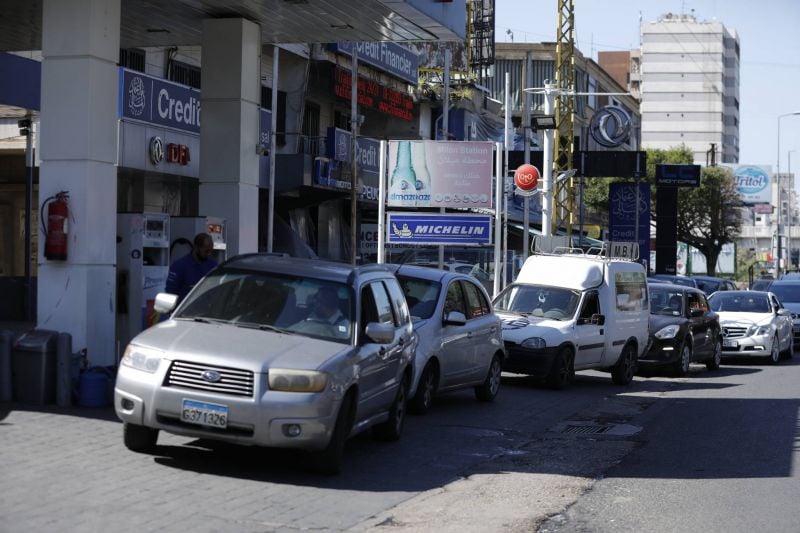
Vehicles queue at a gas station on Wednesday. (Credit: Marc Fayad)
BEIRUT — Queues formed at gas stations again Wednesday as motorists sought fuel amid rising prices and deepening economic uncertainty after the Lebanese lira fell to record lows this week.
The Energy Ministry announced a price hike Wednesday morning, raising the cost of 20 liters of 95-octane gasoline to LL38,900 and diesel to LL27,700 — the latest in a string of increases that has seen the price of fuel soar by some 50 percent since the beginning of the year.
The price hikes — and method of pricing — have added to the pressure on a population suffering under the worst economic crisis since the 1975-90 Civil War.
Fuel station owners had halted some operations prior to Wednesday’s weekly announcement of new prices in a bid to hedge against the lira’s collapse. “If they sold their stocks on Tuesday and collected lira, they won’t be able to restock the same quantities the next day [without] losing capital,” said Georges Fayyad, the head of Association for Petroleum Importing Companies.
However, some stations and suppliers were hoarding fuel in anticipation of Wednesday’s price increase in order to maximize their profits, a fuel supplier told L’Orient Today on condition of anonymity. Stations buy fuel at a lower price on Tuesdays, then turn around and sell at the higher price the following day.
Petrol retailers and suppliers resumed normal operations on Wednesday.
There are two main reasons behind the rising prices. Global oil prices have soared over the past months while the lira plunged to record lows, reaching LL15,300 to the dollar on Tuesday before retreating.
Banque du Liban provides foreign currency facilities to fuel importers to cover 90 percent of their imports at the official peg of LL1507.5 to the US dollar, while the rest is covered by money changers at the parallel market rate.
For the coming week, petrol is priced based on an unofficial exchange rate of LL14,000 to the dollar and a barrel price of $68, Georges Brax, the chair of Brax Petroleum, told our sister publication L’Orient-Le Jour.
The 10 percent not covered by BDL has an outsized effect on the price at the pump. About LL10,500 of the price of 95-octane gasoline — 27 percent — comes from the non-subsidized share.
Aside from pricing, concerns have also been raised over BDL’s ability to keep subsidizing 90 percent of fuel imports. The central bank has decreased its credit lines to ration its dwindling foreign reserves. It is now only providing dollar facilities for one shipment every 20 days, Fayyad said.
These facilities are “just enough” to avoid shortages, he added, highlighting the risk of potential shortages if consumers rush to buy excessive quantities.
Importers have stopped buying 98-octane gasoline due to the high cost of importing both 95- and 98-octane gas in one shipment, a distributor told L’Orient Today. It is currently very difficult to find 98-octane variety.
As BDL’s reserves dwindle toward a critical threshold, caretaker Finance Minister Ghazi Wazni told Bloomberg News on Tuesday that the government plans to gradually increase fuel prices at stations in the coming months by reducing gasoline subsidies from 90 percent to 85 percent.
Such a minimal change in the subsidized share would have a significant impact on the price of petrol, which would aggravate pre-existing vulnerabilities, pushing the Lebanese deeper into poverty as day-to-day necessities become even harder to access.